Books | Resources
While nearly everyone plans for retirement, and no one is guaranteed it, not many of us plan for death while all of us are guaranteed it. Death is a universal experience no matter your age. Our desired outcome is that people have a conversation with a friend or family member about how they wish to live their lives and make more considered and comfortable decisions about their final days.
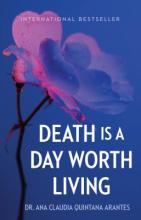
Dr. Ana Claudia Quintana Arantes's viral TED Talk on end-of-life care cemented her, a palliative care doctor in Brazil, as a global leader on living and dying well. Her international bestseller, Death Is a Day Worth Living, has been translated into eight languages and now is being offered in English for the first time. Death Is a Day Worth Living touches a universal nerve, speaking to our most intimate moments and to the vital part of who we are as caregivers and loving family members. With her expertise, Dr. Quintana Arantes courageously takes on a subject that continues to be taboo, offering nothing short of a revolutionary way to reconsider the act of dying. We must care for each other, our loved ones, and patients in profound ways, even when there is no longer the possibility of cure. "It is only through awareness of death that we hasten to build the being that we ought to be," writes Dr. Quintana Arantes as she conveys a powerful sense that we need to--and can--do more to ensure that everyone has a well-managed and lovingly supported death, and that to do so is a celebration of their life and humanity, and those of their caretakers.
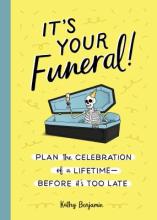
A practical guide to planning your funeral, including worksheets and guided journal prompts.
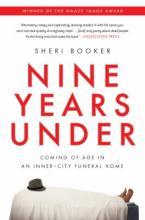
Sheri Booker was only fifteen years old when she started working at Wylie Funeral Home in West Baltimore. She had no idea that her summer job would become nine years of immersion in a hidden world. Reeling from the death of her beloved great aunt, she found comfort in the funeral home, and soon has the run of the place, from its sacred chapels to the terrifying embalming room.
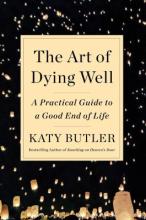
A layperson's guide for positive end of life self care.
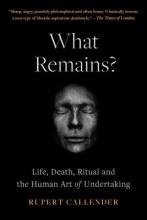
When he became an undertaker, Rupert Callender undertook to deal with the dead for the sake of the living. What Remains? is the brilliant, unforgettable story of the life and work of the world's first punk undertaker-but it is also a book about ordinary, everyday humanity and our capacity to face death with courage and compassion. To say goodbye to the people we love in our own way. In becoming the world's first "punk undertaker" and establishing the Green Funeral Company in Devon, UK, Ru Callender and his partner Claire challenged the stilted, traditional, structured world of the funeral industry; fusing what he had learned from his own deeply personal experiences with death, with the surprising and profound answers and raw emotion he discovered in rave culture and ritual magick. From his unresolved grief for his parents and his cultural ancestors to political and religious non- conformists, social outlaws, experimental pioneers, and acid house culture, Ru Callender has taken too an outsider "DIY" ethos to help people navigate grief and death. He has carried coffins across windswept beaches, sat in pubs with caskets on beer-stained tables, helped children fire flaming arrows into their father's funeral pyre, turned modern occult rituals into performance art and, with the band members of KLF, is building the People's Pyramid of bony bricks in Liverpool. What Remains? is a profound, deeply moving, and politically charged book that will change the way readers think about life, death, and the all-important end-of-life experience.
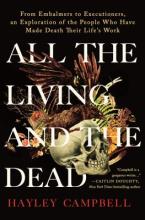
A deeply compelling exploration of the death industry and the people-morticians, detectives, crime scene cleaners, embalmers, executioners-who work in it and what led them there. We are surrounded by death. It is in our news, our nursery rhymes, our true-crime podcasts. Yet from a young age, we are told that death is something to be feared. How are we supposed to know what we're so afraid of, when we are never given the chance to look? Fueled by a childhood fascination with death, journalist Hayley Campbell searches for answers in the people who make a living by working with the dead. Along the way, she encounters mass fatality investigators, embalmers, and a former executioner who is responsible for ending sixty-two lives. She meets gravediggers who have already dug their own graves, visits a cryonics facility in Michigan, goes for late-night Chinese with a homicide detective, and questions a man whose job it is to make crime scenes disappear. Through Campbell's incisive and candid interviews with these people who see death every day, she asks: Why would someone choose this kind of life? Does it change you as a person? And are we missing something vital by letting death remain hidden? A dazzling work of cultural criticism, All the Living and the Dead weaves together reportage with memoir, history, and philosophy, to offer readers a fascinating look into the psychology of Western death.
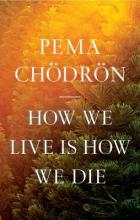
Beloved Buddhist nun and bestselling author Pema Chödrön's wise words on working with the countless changes in our lives to find more freedom and less fear. As much as we might try to resist, endings happen in every moment-the end of a relationship, the end of a day, the end of a breath, and ultimately the end of life. And behind each ending is a beginning-though it may be unclear what the beginning holds. How We Live is How We'll Die shares Pema Chödrön's wise words on working with this flow of life-learning to live with more ease, joy, and compassion though uncertainty; embracing new beginnings; and ultimately preparing for death with more wonder and less fear. Beloved teacher Pema Chödrön writes this book in her 85th year, and her insights on making friends with change are poignant for readers of all ages. This book shares Pema's thoughts on the bardos-the Tibetan teachings on what happens between this life and the next-and how they are relevant in each moment of our life now. She also shares wisdom on working with challenging emotions of craving, aggression, and ignorance, transforming them into a path of awakening and love. The more freedom we can find in our hearts and minds as we live, the more fearlessly we'll be able to confront death and life's countless changes.
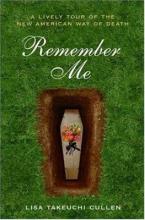
Cullen has created a humorous and poignant chronicle of her travels around the country to discover how Americans -- baby boomers, in particular -- are reinventing the rites of dying. What she discovered is that the people who reinvented youth, redefined careers, and reconceived middle age have created a new attitude toward the afterlife. They no longer want to take death lying down; instead, they're taking their demise into their own hands and planning the after-party. Cullen begins her journey at a national undertakers' convention in Nashville, where she checks out the latest in death merchandise. Traveling with her newborn infant on her back, she hears stories of modern-day lobster-shaped caskets and other unconventional containers for corpses; the booming cremation industry that has spawned a slew of "end-trepreneurs," including a company that turns cremated remains into diamonds; and even mishaps like dove releases gone horribly wrong.
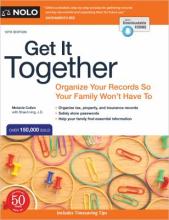
Everything you need to get organized...Do your loved ones know where to find your insurance policies, passwords, title to your car, real estate deeds, health care directive, or even your will? If you're like a lot of people, you keep important information--from automated bill-pay details to passwords to the location of important documents--in your head or stashed in the odd desk drawer. Unfortunately, this disorganization will cause hassles for those who someday take care of you or your estate. Get It Together is a guide and resource to help you gather your records and prepare important documents. With it, you create an organizer for you and a road map for your survivors. It provides a complete framework to help you and others keep track of: secured places and passwords; employment and business records; bank, brokerage, and retirement accounts; personal property and real estate records; dependent children, pets, and livestock; insurance policies; tax records; estate planning documents; funeral arrangements; and letters to loved ones. The workbook is comprehensive, yet straightforward. In the first half, you'll find the pages to create your personal planner. In the second half, you'll find step-by-step instructions and helpful resources to guide your completion of each section.
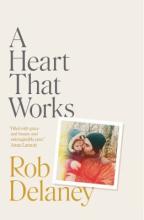
In 2016, Rob Delaney's one-year-old son, Henry, was diagnosed with a brain tumor. The family had moved from Los Angeles to London with their two young boys when Rob's wife was pregnant with Henry, their third. The move was an adventure that would bind them even more tightly together as they navigated the novelty of London, the culture clashes, and the funhouse experience of Rob's fame--thanks to his role as co-creator and co-star of the hit series Catastrophe. Henry's illness was a cataclysm that changed everything about their lives. Amid the hospital routine, surgeries, and brutal treatments, they found a newfound community of nurses, aides, caregivers, and fellow parents contending with the unthinkable. Two years later, Henry died, and his family watched their world fall away to reveal the things that matter most.
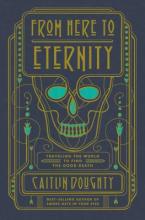
Describes death customs and rituals from around the world, exploring how they compare to the impersonal American system and how mourners respond best when they participate in caring for the deceased.
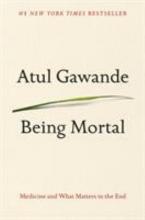
Medicine has triumphed in modern times, transforming birth, injury, and infectious disease from harrowing to manageable. But in the inevitable condition of aging and death, the goals of medicine seem too frequently to run counter to the interest of the human spirit. Nursing homes, preoccupied with safety, pin patients into railed beds and wheelchairs. Hospitals isolate the dying, checking for vital signs long after the goals of cure have become moot. Doctors, committed to extending life, continue to carry out devastating procedures that in the end extend suffering.
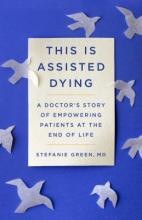
Dr. Stefanie Green has been forging new paths in the field of medical assistance in dying since 2016. In her landmark memoir, Dr. Green reveals the reasons a patient might seek an assisted death, how the process works, what the event itself can look like, the reactions of those involved, and what it feels like to oversee proceedings and administer medications that hasten death. She describes the extraordinary people she meets and the unusual circumstances she encounters as she navigates the intricacy, intensity, and utter humanity of these powerful interactions. Deeply authentic and powerfully emotional, This Is Assisted Dying contextualizes the myriad personal, professional, and practical issues surrounding assisted dying by bringing readers into the room with Dr. Green, sharing the voices of her patients, her colleagues, and her own narrative. As our population confronts issues of wellness, integrity, agency and community, and how to live a connected, meaningful life, this progressive and compassionate book by a physician at the forefront of medically assisted dying offers comfort and potential relief. This Is Assisted Dying will change the way people think about their choices at the end of life, and show that assisted dying is less about death than about how we wish to live.
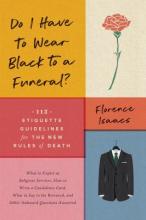
Everything you ever wanted to know about funeral etiquette but were afraid to ask. When is attending a funeral or memorial service 'a must,' and when is it optional? Can a eulogy be funny? Can I scatter my brother's ashes in the backyard? Should I place a death notice or an obituary? What's the difference? These are all questions that Florence Isaacs has been asked as a blogger for Legacy.com, a role that earned her the nickname of the 'Dear Abby of Death.' In Do I Have to Wear Black to a Funeral?, she answers urgent questions about grief, funerals, different religious ceremonies, and more, offering practical guidelines for modern situations-and, yes, what to wear. Isaacs' honest, often entertaining, responses provide no-nonsense information to millennials, while also helping older generations navigate new waters, like how to send condolences through social media. She offers fresh insights, plus an etiquette map of the right things to do and say, in her familiar, sensitive, and sincere style.
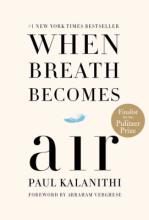
For readers of Atul Gawande, Andrew Solomon, and Anne Lamott, a profoundly moving, exquisitely observed memoir by a young neurosurgeon faced with a terminal cancer diagnosis who attempts to answer the question What makes a life worth living? At the age of thirty-six, on the verge of completing a decade's worth of training as a neurosurgeon, Paul Kalanithi was diagnosed with stage IV lung cancer. One day he was a doctor treating the dying, and the next he was a patient struggling to live. And just like that, the future he and his wife had imagined evaporated. When Breath Becomes Air chronicles Kalanithi's transformation from a naïve medical student "possessed," as he wrote, "by the question of what, given that all organisms die, makes a virtuous and meaningful life" into a neurosurgeon at Stanford working in the brain, the most critical place for human identity, and finally into a patient and new father confronting his own mortality. What makes life worth living in the face of death? What do you do when the future, no longer a ladder toward your goals in life, flattens out into a perpetual present? What does it mean to have a child, to nurture a new life as another fades away? These are some of the questions Kalanithi wrestles with in this profoundly moving, exquisitely observed memoir. Paul Kalanithi died in March 2015, while working on this book, yet his words live on as a guide and a gift to us all.
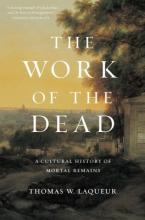
The Greek philosopher Diogenes said that when he died his body should be tossed over the city walls for beasts to scavenge. Why should he or anyone else care what became of his corpse? In The Work of the Dead, acclaimed cultural historian Thomas Laqueur examines why humanity has universally rejected Diogenes's argument. No culture has been indifferent to mortal remains. Even in our supposedly disenchanted scientific age, the dead body still matters--for individuals, communities, and nations. A remarkably ambitious history, The Work of the Dead offers a compelling and richly detailed account of how and why the living have cared for the dead, from antiquity to the twentieth century. The book draws on a vast range of sources--from mortuary archaeology, medical tracts, letters, songs, poems, and novels to painting and landscapes in order to recover the work that the dead do for the living: making human communities that connect the past and the future. Laqueur shows how the churchyard became the dominant resting place of the dead during the Middle Ages and why the cemetery largely supplanted it during the modern period. He traces how and why since the nineteenth century we have come to gather the names of the dead on great lists and memorials and why being buried without a name has become so disturbing.
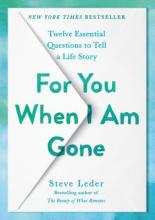
Writing an ethical will, a document that includes stories and reflections about your past, is an ancient tradition. It can include joy and regrets, and ultimately becomes both a way to remember a loved one who is gone and a primer on how to live a better, happier life. Beloved Rabbi Steve Leder has helped thousands of people to write their own ethical wills, and in this intimate book helps us write our own.
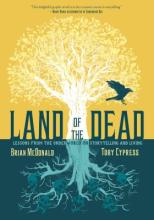
There is wisdom in the land of the dead, for it is the place that all stories lay to rest. And what is a story, if not a simulation of survival? Wielding his massive experience from film, tv, comics, and more, Brian McDonald lays out a history of storytelling and shows the reader how the best tales tug at our truest biological instinct: the need to survive. Readers will see how different forms of survival--physical, emotional, spiritual--inform the arc of character development in a way that makes them more complex and compelling. And how plot and circumstance must then force your protagonist to meet their worst nightmare. Toby Cypress's electric art guides the reader through the underworld, visualizing each narrative masterpiece, and bringing the ideas to life. Whether you're in film, books, comics, or simply a story enthusiast, this book offers a way to see character development and the crafting of plot through the lens of human questions of morality and mortality.
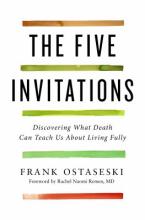
Life and death are a package deal. They cannot be pulled apart and we cannot truly live unless we are aware of death. [This book is a] meditation on the meaning of life and how maintaining an ever-present consciousness of death can bring us closer to our truest selves ... [Zen Hospice Project cofounder Frank Ostaseski] ... distills the lessons gleaned over the course of his career, offering [a] ... guide that points to a radical path to transformation.
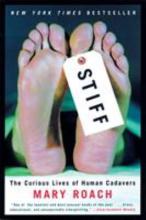
For two thousand years, cadavers—some willingly, some unwittingly—have been involved in science’s boldest strides and weirdest undertakings. They’ve tested France’s first guillotines, ridden the NASA Space Shuttle, been crucified in a Parisian laboratory to test the authenticity of the Shroud of Turin, and helped solve the mystery of TWA Flight 800. For every new surgical procedure, from heart transplants to gender confirmation surgery, cadavers have helped make history in their quiet way. Stiff investigates the strange lives of our bodies postmortem and answers the question: What should we do after we die?
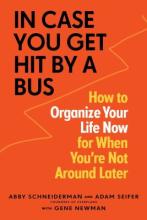
A step-by-step program for getting your life in order, so you're prepared for the unexpected. The odds of getting hit by a bus are 495,000 to 1. But the odds that you're going to die some day? Exactly. Even the most disorganized among us can take control of our on- and off-line details so our loved ones won't have to scramble later. The experts at Everplans, a leading company in digital life planning, make it possible in this essential and easy-to-follow book. Breaking the task down into three levels, from the most urgent (like granting access to passwords), to the technical (creating a manual for the systems in your home), to the nostalgic (assembling a living memory), this clear, step-by-step program not only removes the anxiety and stress from getting your life in order, it's actually liberating. And deeply satisfying, knowing that you're leaving the best parting gift imaginable. When you finish this book, you will have: A system for managing all your passwords and secret codes Organized your money and assets, bills and debts A complete understanding of all the medical directives and legal documents you need--including Wills, Powers of Attorney, and Trusts A plan for meaningful photos, recipes, and family heirlooms Records of your personal history, interests, beliefs, and life lessons An instruction manual for your home and vehicles Your funeral planned and obituary written (if you're up for it).
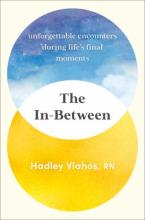
Passionate advocate for end-of-life care and TikTok star Nurse Hadley shares moving stories of joy, wisdom, and redemption from her patients' final moments, offering powerful lessons on facing death, recovering from loss, and how to live your life in this deeply personal memoir. Talking about death and dying is considered taboo in popular culture, even in the medical field. Our understanding of death is riddled with misconceptions: memories flashing before our eyes, cascading regrets, and chasing bright lights at the end of tunnels. But for most people, this will not be their experience. Rather, it will be a slower process requiring preparedness, good humor, and a bit of faith. At the forefront of changing attitudes around palliative care is TikTok personality Hadley Vlahos, whose videos collect and share the heartbreaking, remarkable, and uplifting stories of her patients. Vlahos was raised in a strict religious household, but began questioning her beliefs after she got pregnant at nineteen and was shunned by her community. A single mother on welfare, she went to nursing school with the sole purpose of keeping a roof over her and her son's head. Soon, however, nursing became more than a job, and she found her calling in palliative care and hospice work. Now, Vlahos is changing the conversation around death, showing that end-of-life care can teach us just as much about how to live as it does about how we die. In The In-Between, Vlahos recounts the most impactful stories from the people she's worked with-from the woman struggling with her religious beliefs despite her strict Catholic upbringing, to the older man seeing visions of his late daughter, to the young patient who laments that she spent so much of her short life worrying about what others thought of her-while also sharing her own fascinating journey. With profound insight, humility, and respect, The In-Between is a heart-rending memoir about how caring for others can transform a life, while also offering wisdom and comfort for those dealing with loss and providing inspiration for how to live now.
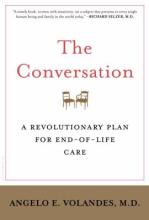
There is an unspoken dark side of American medicine: keeping patients alive at all costs. Two thirds of Americans die in healthcare institutions tethered to machines and tubes, even though research indicates that most prefer to die at home in comfort, surrounded by loved ones. The question 'How do you want to live?' must be posed to the seriously ill because they deserve to choose. If doctors explain options--including the choice to forego countless medical interventions that are often of little benefit--then patients can tell doctors how they wish to spend the remainder of their lives.
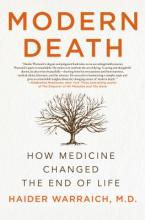
There is no more universal truth in life than death. No matter who you are, it is certain that one day you will die, but the mechanics and understanding of that experience will differ greatly in today's modern age. Dr. Haider Warraich is a young and brilliant new voice in the conversation about death and dying started by Dr. Sherwin Nuland's classic How We Die: Reflections on Life's Final Chapter, and Atul Gawande's recent sensation, Being Mortal: Medicine and What Matters in the End. Dr. Warraich takes a broader look at how we die today, from the cellular level up to the very definition of death itself. The most basic aspects of dying--the whys, wheres, whens, and hows--are almost nothing like what they were mere decades ago. Beyond its ecology, epidemiology, and economics, the very ethos of death has changed. Modern Death, Dr. Warraich's debut book, will explore the rituals and language of dying that have developed in the last century, and how modern technology has not only changed the hows, whens, and wheres of death, but the what of death. Delving into the vast body of research on the evolving nature of death, Modern Death will provide readers with an enriched understanding of how death differs from the past, what our ancestors got right, and how trends and events have transformed this most final of human experiences.